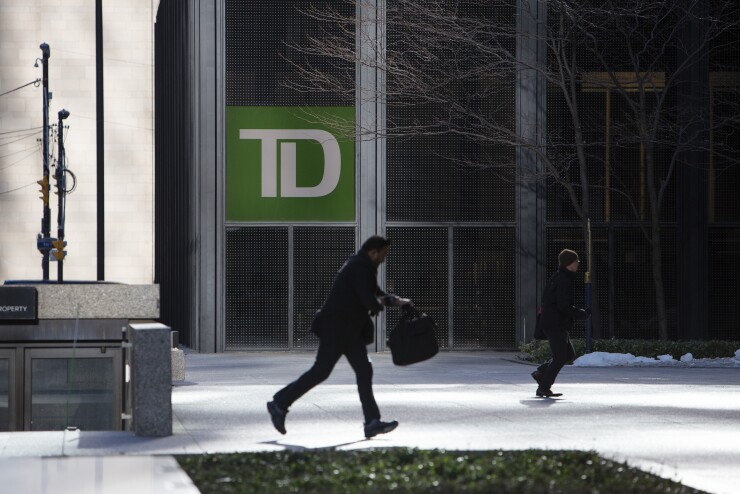
TD Bank Group's historic money-laundering-related failures in the U.S., which led to record penalties this fall, have also left the bank on the hook for fixing its compliance problems elsewhere.
The Toronto-based bank's enterprise-wide anti-money-laundering program was rated unsatisfactory after a company review in 2023, according to TD's most recent annual report, released last week. CEO Bharat Masrani said when the report was released that TD is
In Canada, TD submitted a "detailed plan" to the country's AML enforcement agency — the Financial Transactions and Reports Analysis Centre of Canada, or Fintrac — to address compliance violations, the bank's annual report said.
TD's Canadian strategy for combating money laundering, which it expects to be implemented by the end of 2025, is divided into five "core pillars,"
"We have learned from the U.S. experience and are applying those learnings globally," Masrani said on the company's Dec. 5 earnings call. "Though we have not identified issues to the same extent or experienced the same severe AML-related events in markets outside the U.S., we do need to improve and strengthen our enterprise-wide program."
A spokesperson added in an email that the bank is implementing "necessary enhancements" and continues to make "steady progress."
Though Masrani did not specifically mention AML challenges in Canada on the call, the vast majority of TD's non-U.S. business is based there. The two North American countries account for roughly 99% of the bank's total loan portfolio, according to its most recent annual report.
In October, U.S. regulators and law-enforcement officials hit TD with more than
The latest development in the bank's money-laundering scandal came Wednesday, when U.S. officials announced the
Critics of Canadian anti-money-laundering enforcement contend that TD's sweeping risk management issues are symptomatic of an overly lax compliance culture in Canada.
Ross Delston, an independent American attorney and former banking regulator with the Federal Deposit Insurance Corp., said the issue with Canada isn't that its laws don't meet international standards.
"It's that the implementation of regulations by regulators and banks is weak, so the rules are in place, but the effectiveness of the rules is questionable," he said.
Fintrac's function in Canada as a financial intelligence unit mirrors that of the U.S. Treasury Department's Financial Crime Enforcement Network, known as Fincen. But its enforcement capabilities are
The Canadian agency's authority is limited to doling out administrative fines, which leads to much cheaper price tags for banks' AML infractions. Jim Richards, who previously led global financial crimes risk management at Wells Fargo, said the relatively modest fines aren't designed to punish institutions, but to encourage compliance.
"It's the kinder, gentler Canada," said Richards, now the founder of RegTech Consulting.
U.S. regulatory and law-enforcement agencies run a harsher system, he added. The stateside
In the fall of 2023, shortly after TD's AML problems began to come to light, Fintrac CEO Sarah Paquet said the agency would aim to ramp up its enforcement efforts for all businesses. Paquet said that the agency saw "serious deficiencies" in compliance leading to "transactions related to heinous crimes that have made the headlines across the country."
"One thing is clear: as we look to the future, the status quo is not an option," Paquet said in November 2023.
Sen. Elizabeth Warren said in a letter that the Department of Justice intentionally avoided threatening TD Bank's charter to operate. The Massachusetts Democrat also pressed the agency to prosecute bank executives.
Six months later, Fintrac fined TD 9.2 million Canadian dollars for five violations, including failing to submit suspicious transaction reports and failing to conduct ongoing monitoring of business relationships.
The fine was the largest in Fintrac's history, but it was less than 0.5% of what TD was forced to pay in the States.
Fintrac says that it has doled out its four largest-ever penalties in the last year, with TD's topping the list. Over the same period, the agency has also disclosed the highest number of cases of non-compliance to law enforcement for potential criminal investigation, it said.
Suzanne Creighton, an anti-money laundering auditor and executive consultant based in Canada, said Fintrac's structure of enforcement is demonstrative of an overly lenient regulatory landscape that allows money laundering to thrive.
"Everybody here is saying that until we take the same position as the U.S., and [fines] do become punitive, nothing will ever change," Creighton said.
Creighton, who has worked at several of the largest banks in Canada, including TD, said that if Canadian banks operating in the U.S. have AML issues in one country, they likely have similar problems in the other.
Fintrac announced last week that it has signed a memorandum of understanding with U.S. banking regulators. An agency spokesperson added in an email that Fintrac has had agreements with Fincen in place over the last 20 years, though the terms of such agreements aren't public.
While Fintrac also collaborates with other international financial intelligence units, Richards said there's a lack of transparency about what information is shared and how it's used.
Even though TD has been forced to pay record fines in both the U.S. and Canada, Creighton said she hasn't seen the mindset around AML enforcement change north of the border.
"What we have in Canada is a culture problem, and that has to be changed," Creighton said. "It's never been addressed holistically here, and I think it's part of this whole lax approach that, 'You can do whatever you want.' ... There's no incentive to stop here."






